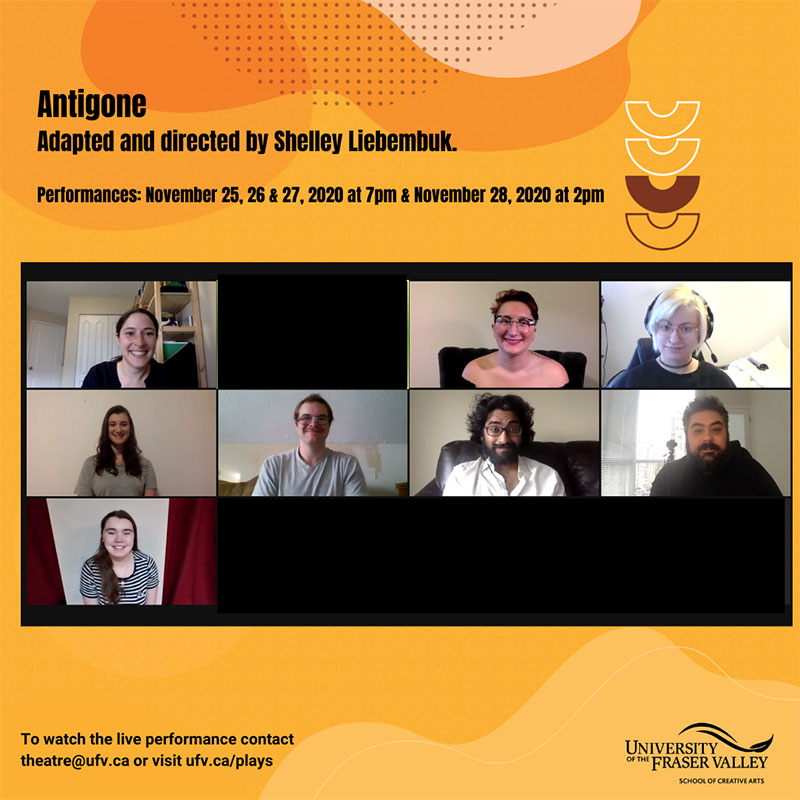Shelly Liebembuk’s ambitious Zoom adaptation offered live theatre online
UFV Theatre presented Antigone over Zoom from Nov. 25-28. Sophocles’ Antigone is a tragic Greek play, which director Shelley Liebembuk adapted for the Zoom platform from Ian Johnston’s English translation. The cast and crew presented Antigone in their own homes. Although I had previously connected with Liebembuk to discuss the format of Antigone and the future of theatre, I went to the Wednesday performance with little knowledge of the Greek tragedy. Overall, I was impressed with the creativity of the Zoom platform, although the short performance length and virtual format made it difficult to become invested in the play.
The play opened with an introductory narration by first-year student Isabella Dimanno, who played three different roles: Ismene, the guard, and a narrator character. I spoke with Dimanno over Zoom before the performance.
The show’s greatest strength was the way it bridged the classic work and modern performance. Liebembuk’s adaptation retained the poetic language of the original script, but the show utilized the Zoom platform to emphasize emotions, differentiate between characters, and visually enhance the performance. At certain points, Ismene stood off-screen and spoke into a mirror, then moved into the shot to give the illusion of two narrators. At another point, the actor playing Creon used a Zoom background that looked like a static television, which heightened the character’s distress, projecting it on the screen. The production also transitioned between scenes with white title cards that had a short description of each new scene.
“For a couple scenes, I get to use the things around in my basement that are unique to my place and my house,” Dimanno said. “We’ve been able to utilize that and make some really cool shots for the different scenes. It’s definitely been different, but it’s been a good different so far.”
However, Antigone lacked the personal touch of an in-person performance. Without the immediate relationship between the audience and the play, I found it difficult to feel the same emotions the characters portrayed. Unlike other screen formats like television or film, there was not a large variety of camera angles or background settings, so I didn’t feel grounded in the story. In addition, the show was only 30 minutes long, so there wasn’t much time to become emotionally invested.
Dimanno also recognized the lack of an in-person atmosphere. “I miss feeling the energy of the other people,” she said. “I miss seeing other people and getting to bounce off each other and feed off of each other, as well as the audience. When the audience is into it, and you can feel that they’re into it, it just makes it so much easier for you as a performer.”
I was also able to sit down with third-year student Makayla Pollock to discuss Antigone. She was part of the digital media team and worked to cue the sounds during the performance. Antigone was her first production.
“I’m very new to the theatre world, and I’m very eager to learn as much as I can,” she said. However, she recognized that it wasn’t quite the same over Zoom.
“It’s kind of difficult to get a real understanding of what it’s like during an actual show that’s live,” she said. “I don’t come from that experience of knowing what the stage looks like, how it feels, where you’re located. I’m very eager to get into the [physical theatre] setting to explore what we have to offer at UFV.”
The virtual format certainly limited the show, but it is important to keep in mind that live performances are not currently possible given public health guidelines. Despite this, the theatre department offered a creative story with minimal props, lighting, and space. For my first viewing of a Zoom theatre production, I felt that Antigone excelled in its virtual creativity.
Dimanno understood the importance of being creative in what she described as “a time when we need creativity the most.” She continued: “It’s been a lot of fun being able to work on this project and has been really great to be able to have a creative outlet during quarantine. Theatre has been kind of like my therapy for quite a few years, to be honest.”
In Antigone, the titular character chooses to bury her dead brother despite her uncle, King Creon, ruling against it. The story follows Creon, Antigone, and her sister Ismene as they struggle to navigate a state law that seems to be unjust. Pollock spoke about what Antigone’s message can mean for today’s audience — even for an audience over Zoom.
“It makes people think more so about their actions, their choices, what they do, and what they say,” she explained. “I think the meaning behind it can be modernized and brought into today’s society, and make you think that even if you stand alone, it doesn’t mean there aren’t people supporting you whether you see them or not. Every action you make does have impact, even if you think it’s a minor part of a story.”
Despite its challenges, theatre still plays a role in quarantine, even if it is to simply offer creativity to performers and its student audience. Creativity will never lose its meaning.
UFV SoCA
Danaye studies English and procrastination at UFV and is very passionate about the Oxford comma. She spends her days walking to campus from the free parking zones, writing novels she'll never finish, and pretending to know how to pronounce abominable. Once she graduates, she plans to adopt a cat.


